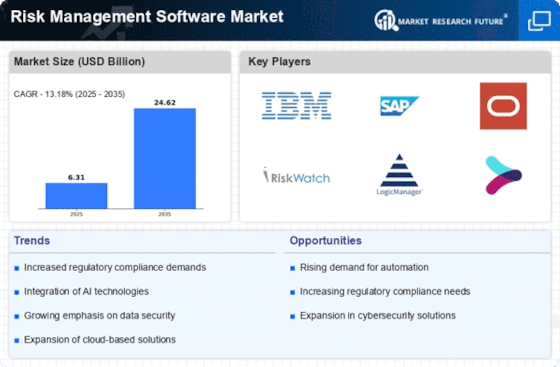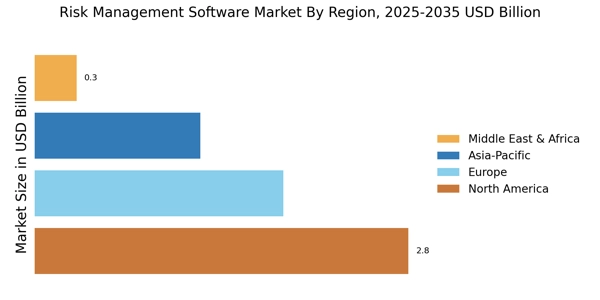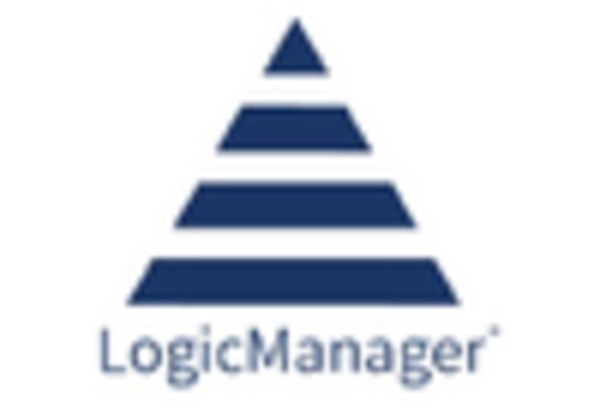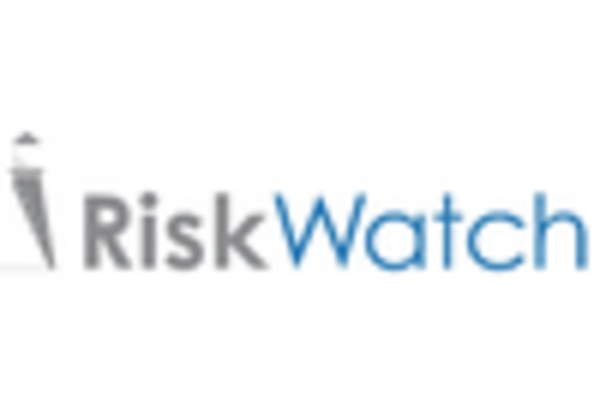Integration of Advanced Technologies
The Risk Management Software Market is experiencing a notable shift towards the integration of advanced technologies such as artificial intelligence and machine learning. These technologies enhance predictive analytics, enabling organizations to identify potential risks more effectively. As per recent data, the adoption of AI-driven risk management solutions is projected to grow at a compound annual growth rate of 25% over the next five years. This trend indicates a significant transformation in how organizations approach risk assessment and mitigation. Furthermore, the incorporation of big data analytics allows for real-time monitoring and analysis, which is crucial in today's fast-paced business environment. Companies that leverage these technologies are likely to gain a competitive edge, as they can respond to emerging threats more swiftly and accurately.
Regulatory Compliance and Adaptability
The Risk Management Software Market is significantly influenced by the increasing complexity of regulatory requirements across various sectors. Organizations are under pressure to comply with a myriad of regulations, which necessitates the adoption of comprehensive risk management solutions. The market for compliance management software is projected to grow at a CAGR of 15% over the next few years, driven by the need for organizations to adapt to changing regulations. This trend underscores the importance of flexibility in risk management software, as companies seek solutions that can evolve alongside regulatory landscapes. By investing in adaptable risk management tools, organizations can not only ensure compliance but also streamline their operations, thereby reducing the potential for costly penalties and reputational damage.
Focus on Cybersecurity and Data Privacy
In an era where data breaches and cyber threats are rampant, the Risk Management Software Market is witnessing an increased emphasis on cybersecurity and data privacy. Organizations are compelled to adopt robust risk management solutions that not only protect sensitive information but also ensure compliance with stringent regulations. The market for cybersecurity risk management software is expected to reach USD 30 billion by 2026, reflecting a growing recognition of the importance of safeguarding digital assets. This heightened focus on cybersecurity is driving innovation within the industry, as software providers develop more sophisticated tools to address evolving threats. Consequently, organizations that prioritize cybersecurity in their risk management strategies are likely to enhance their resilience against potential attacks.
Rising Awareness of Risk Management Importance
There is a growing recognition of the importance of risk management across various industries, which is propelling the Risk Management Software Market forward. Organizations are increasingly aware that effective risk management is not merely a compliance requirement but a strategic imperative that can enhance overall business performance. Recent surveys indicate that nearly 70% of executives consider risk management a critical component of their strategic planning processes. This heightened awareness is driving demand for sophisticated risk management software that can provide comprehensive insights and facilitate informed decision-making. As businesses strive to navigate uncertainties and capitalize on opportunities, the role of risk management software becomes increasingly vital in fostering a proactive risk culture.
Increased Investment in Risk Management Solutions
The Risk Management Software Market is witnessing a surge in investment as organizations recognize the value of robust risk management frameworks. Companies are allocating more resources towards risk management solutions to mitigate potential losses and enhance operational efficiency. Recent data suggests that the global spending on risk management software is expected to exceed USD 20 billion by 2025, reflecting a strong commitment to risk mitigation strategies. This trend is particularly evident in sectors such as finance, healthcare, and manufacturing, where the stakes are high, and the consequences of inadequate risk management can be severe. As organizations continue to prioritize risk management, the demand for innovative software solutions that can address diverse risk scenarios is likely to grow.

















